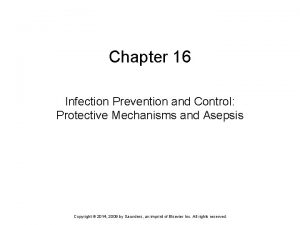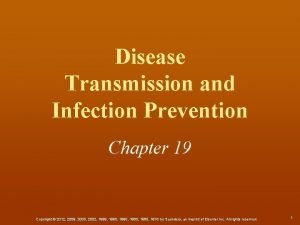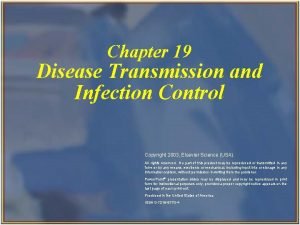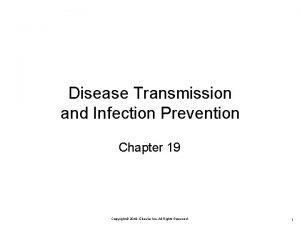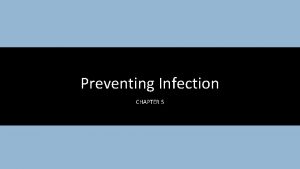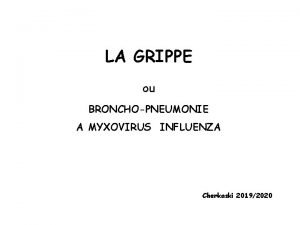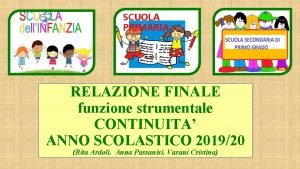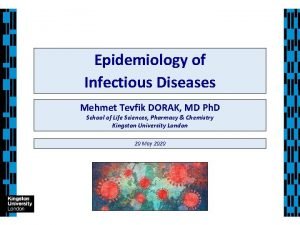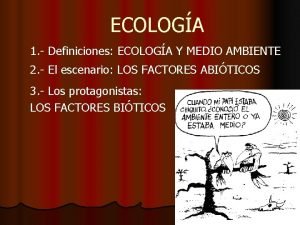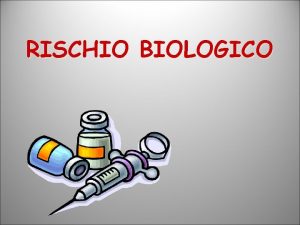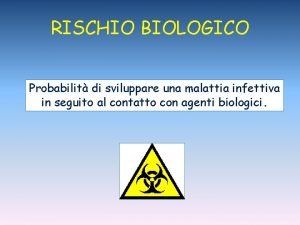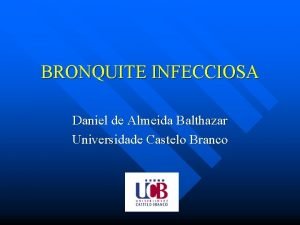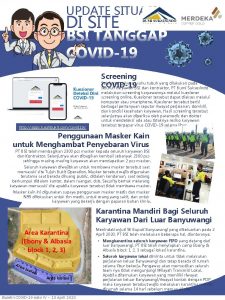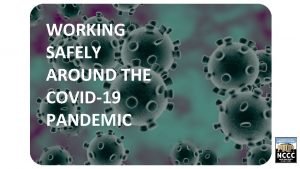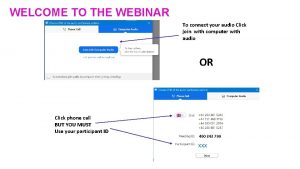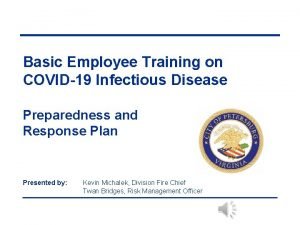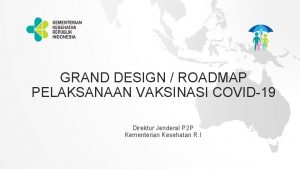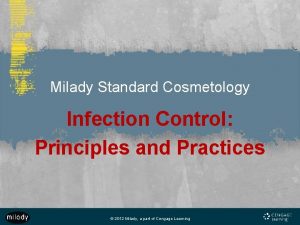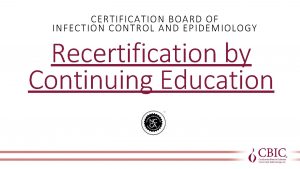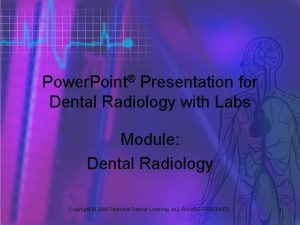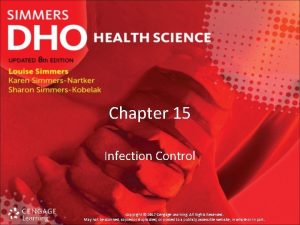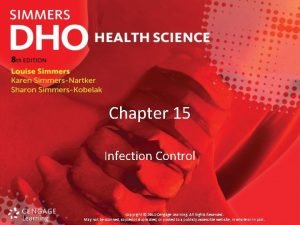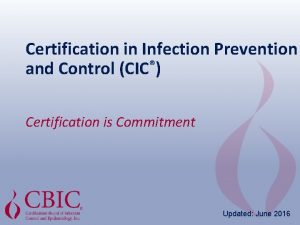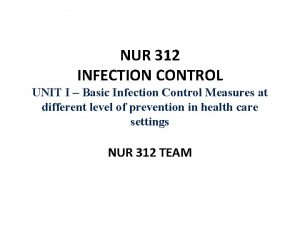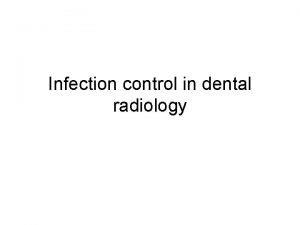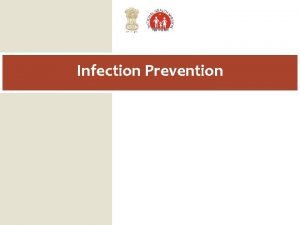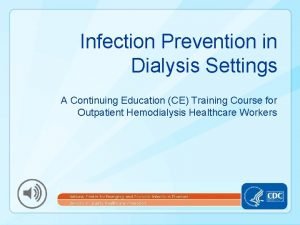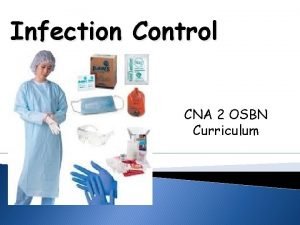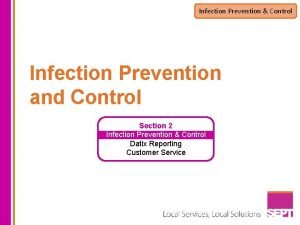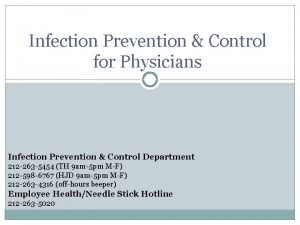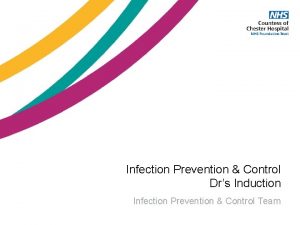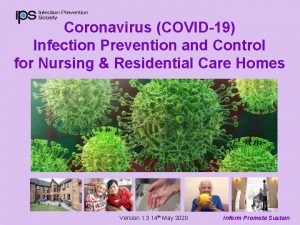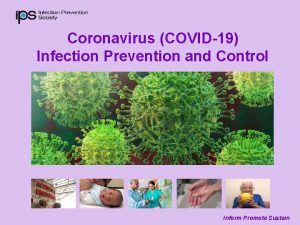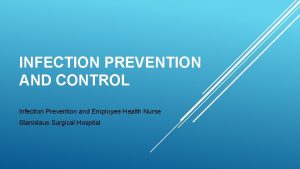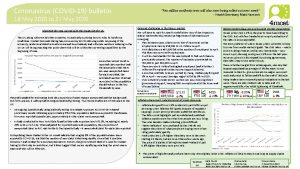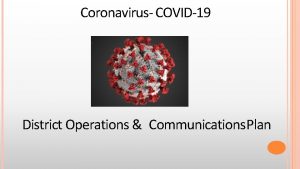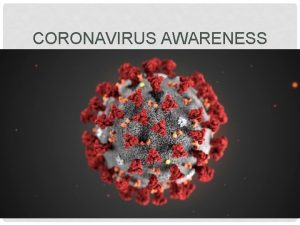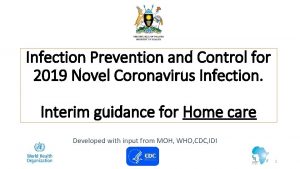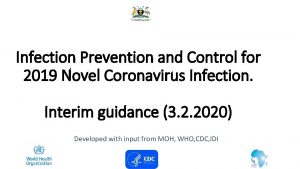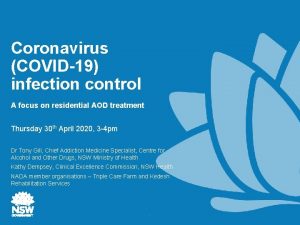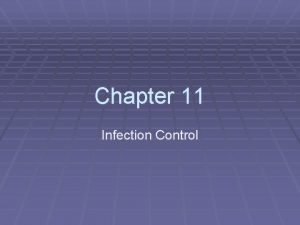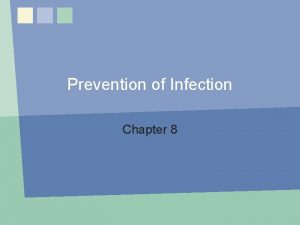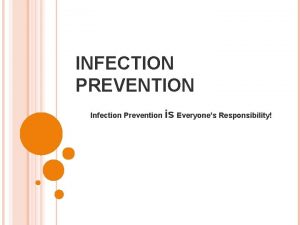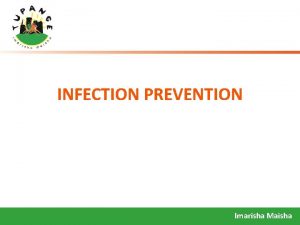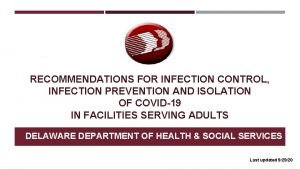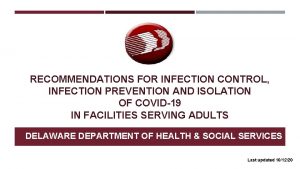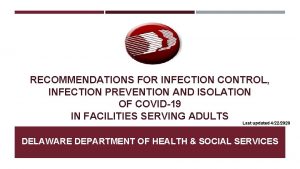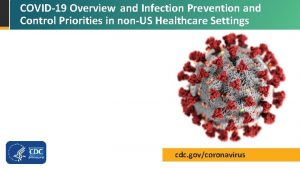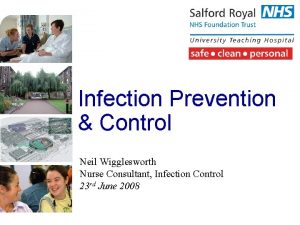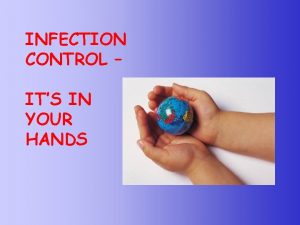Coronavirus COVID19 Infection Prevention and Control The Operating





























- Slides: 29

Coronavirus (COVID-19) Infection Prevention and Control The Operating Department Version 1. 2 14 th April 2020 Inform Promote Sustain

What is Coronavirus and COVID-19 § Coronaviruses are a large family of viruses - they cause infections ranging from the common cold to Severe Acute Respiratory Syndrome (SARS) § Coronaviruses circulate between animals and humans; sometimes new variants of the coronavirus emerge - such as COVID-19 § COVID-19 has the potential to spread widely as lack of immunity means everyone in the population is susceptible Inform Promote Sustain

What are the symptoms of COVID-19? § Symptoms start 5 -11 days after exposure § Similar to seasonal flu § Majority have fever and dry cough (rapid onset) § Symptoms last 5 - 6 days § Severe illness starts day 7 § Shortness of breath § Lung inflammation § Pneumonia Proportion of cases Symptom Fever >37. 8 o. C 88% Dry cough 68% Fatigue 38% Sputum 33% Shortness of breath 19% Muscle/joint pain 15% Sore throat 14% Headache 14% Inform Promote Sustain

Severity of COVID-19 illness § Most people have no obvious symptoms (30 -40%) § Most children get mild disease § More severe disease in: § § § Critical Respiratory/muliorgan failure Severe Shortness of breath; Respiration; O 2 sats Mild Older people Diabetics Heart disease Chronic respiratory disease Immune compromised § Less than 2% of cases fatal Fever, cough Undetected § Highest in high risk groups Inform Promote Sustain

How is COVID-19 transmitted? § Exposure to large respiratory droplets § Coughing/sneezing droplets onto mucous membranes § mouth, nose, eyes § Need close contact for this to occur (within two meters) § Contact with respiratory secretions § Directly or via contaminated surfaces § Tissues contaminated with respiratory secretions § Transferred by touching mucous membranes Not transmitted in air except during a procedure involving the respiratory tract that generates aerosols Inform Promote Sustain

Infection Prevention & Control Strategies 1. Cough etiquette 2. Standard precautions 3. Isolation precautions Inform Promote Sustain

Personal hygiene to prevent spread § Cough etiquette § Cover mouth and nose with a tissue or your sleeve (not your hands) § Dispose of tissues directly into bin § Hand hygiene Ensure patients § after contact coughing/sneezing have hand wipes or alcohol gel available Inform Promote Sustain

Standard Precautions § Essential to minimize risk of transmission between staff and patients § Will reduce the risk of transferring the virus from patients not recognized to have COVID-19 Ø Ø Hand hygiene Protective clothing for contact with body fluid Safe disposal of waste Clean equipment & environment Inform Promote Sustain

Hand Hygiene § Immediately before touching a patient § Before a clean/aseptic procedure § Immediately after touching a patient or their surroundings § After removing gloves Alcohol gel is effective against COVID-19 Soap and water should be used if hands are soiled Inform Promote Sustain

Patient hand hygiene § Encourage patients to clean their hands § After coughing/sneezing § Before eating § After toilet § Make hand wipes or alcohol gel available at bedside for patients to use Inform Promote Sustain

Standard precautions: Gloves § For procedures involving DIRECT contact with blood or body fluid § Risk assess procedure § if gloves are indicated put on immediately before commencing procedure § Remove and decontaminate hands immediately after the procedure Take gloves off promptly! Virus (and other pathogens) are transferred between patients, surfaces and your own mucous membranes on your gloved hands Inform Promote Sustain

Standard Precautions: Aprons § For procedures where there is a risk that the clothing may become soiled § Risk assess procedure § If indicated put on immediately before commencing procedure § Remove if contaminated or on leaving the patient and decontaminate hands Inform Promote Sustain

Transmission-based Precautions Droplet precautions Airborne precautions § Operating theatres § Patient with possible or confirmed COVID-19 where no Aerosol Generating Procedures (AGP) § Surgery involving AGP on patient with possible or confirmed COVID-19 § Patient transfers § Patient with possible or confirmed COVID-19 Inform Promote Sustain

Aerosol Generating Procedures § Associated with high velocity air passing over respiratory mucosa Ø Generates tiny (<5µm) respiratory particles which remain airborne § Only perform AGP on COVID 19 patients if essential § Only essential staff present § Airborne precautions required (FFP 3 mask/gown) Aerosol Generating Procedures (AGP) § Intubation & extubation § Manual ventilation/open suctioning § Surgery - high speed devices § Dental - high speed drilling § Tracheostomy § Upper GI endoscopy + open suction of respiratory tract § Bronchoscopy & ENT with suction § High flow nasal oxygen § Non-invasive ventilation (Bi. PAP, CPAP) & HFOV § Sputum induction Inform Promote Sustain

FFP 3 Respirator Masks § Filters out very small particles § Protects from inhalation of fine airborne particles (droplet nuclei) § Filtration effective only if sealed to contour of face § Fit testing required to ensure effective protection § Fit check before each use § Required for procedures which generate aerosols of respiratory secretions (AGP) § Not necessary for close contact without AGP § Must be worn with long-sleeved waterproof gown Inform Promote Sustain

Droplet Precautions known or suspected COVID-19 patients § Infection is transmitted by respiratory droplets and contact with respiratory secretions therefore: § § Place patient at end of list Admit directly to operating theatre Anaesthetise & recover in operating theatre Protective clothing for contact (within 2 metres) § Fluid resistant surgical mask, eye protection, gloves, plastic apron § Theatre ventilation must be left on § Dedicated patient equipment where possible § Clean surfaces as for infected patients Surgical masks protect mucous membrane from contamination by large respiratory droplets (and are as effective as FFP 3 for this) Inform Promote Sustain

Protective clothing Known or suspected COVID-19 (no aerosol generating procedures) Direct care (in operating room) § Fluid Resistant Surgical mask (Type IIR) § Eye protection § Gloves § MUST be changed after each task (as per 5 MHH) to protect patient from infection § Apron (or sterile gown if scrubbed) § change if soiled Discard all protective clothing and clean hands on leaving room and when patient discharged Remember to avoid touching your mouth, nose and eyes Inform Promote Sustain

Airborne Precautions AGP on known/suspected COVID-19 patient § Ventilation (ultraclean air or conventional) MUST be on during the AGP procedure § Rapid dilution of aerosols will protect theatre staff § Only staff required to perform procedure to be present § Staff to wear: § § FFP 3 respirator mask Eye protection (visor) Long-sleeved waterproof gown Gloves Inform Promote Sustain

Inform Promote Sustain

Public Health England Inform Promote Sustain

Removal of protective clothing (Doffing) § Discard mask when moist or damaged § Remove PPE in this order: 1. Gloves (then decontaminate hands) 2. Apron/gown (avoid touching contaminated front surface) 3. Mask/eye protection § Decontaminate hands after all PPE has been removed Inform Promote Sustain

Remember! Don’t touch your mouth, nose or eyes. Decontaminate your hands thoroughly on leaving the area/room. Inform Promote Sustain

Summary of precautions for known/suspected COVID-19 patients In-patient areas PPE Operating Department Patient contact (within 2 m) AGP (in room) & high risk areas No AGP Plastic apron Surgical mask - fluidresistant (IIR/EN 14683) Long sleeved disposable gown Risk assess FFP 3 respirator Eye protection Risk assess Disposable gloves Additional precautions may be applied in in-patient areas where there is sustained transmission of COVID-19 AGP = aerosol generating procedures Inform Promote Sustain

Environmental contamination § Surfaces may become contaminated with respiratory secretions § Directly from coughing/sneezing § Indirectly by touching with contaminated hands § Contamination greatest where AGP performed § COVID-19 unlikely to survive in significant numbers on surfaces for longer than a few days § Studies often recover virus RNA but many do not test if viable and able to cause infection § Easily removed by cleaning § Detergent & water followed by disinfectant § Chlorine at 1000 ppm effective Inform Promote Sustain

Medical Equipment For known/suspected COVID-19 patient § Protect ventilators with high efficiency filter § Use closed system suction § Use single-use equipment where possible § Laryngoscope –disposable or processed by sterile services § Video laryngoscope –decontaminate handle as per manufacturers instructions § Near-patient medical equipment § Decontaminate after the patient has left the operating theatre § Use detergent & water followed by disinfectant § Select disinfectant using protocol for infected cases or manufacturers instructions Inform Promote Sustain

Surgical Instruments Used on known/suspected COVID-19 patient § Apply standard infection control precautions to handle instruments after the procedure § Wrap surgical instruments and tray in the usual way § Return wrapped trays directly to sterile services § Clean trolleys using detergent & water followed by disinfectant (chlorine 1000 ppm) Inform Promote Sustain

Cleaning after procedure on known/suspected COVID-19 patient § Aerosols will be rapidly removed by air changes § airborne contamination will eliminated after five mins § Clean surfaces according to infected patient protocol § Commence after patient has left operating theatre § Use detergent followed by chlorine 1000 ppm § Decontaminate cleaning equipment immediately after use § Waste - treat as clinical waste § Linen - place directly into water-soluble bag Inform Promote Sustain

Staff with COVID-19 § If you develop symptoms of a flu-like illness then DO NOT come into work: § Acute onset fever >37. 8 o. C and new persistent cough § Inform your manager § Self-isolate at home for seven days from onset of symptoms § If your symptoms worsen contact NHS 111 § Staff at high risk of complications from COVID-19 § risk-assessment to manage their deployment Inform Promote Sustain

Useful resources Public Health England Campaign Resources https: //campaignresources. phe. gov. uk/resources/campaigns/101 -coronavirus- Public Health England Coronavirus (COVID-19) infection control guidance https: //www. gov. uk/government/publications/wuhan-novel-coronavirus-infectionprevention-and-control NHS England https: //www. england. nhs. uk/ourwork/eprr/coronavirus/ NHS website https: //www. nhs. uk/conditions/coronavirus-covid-19/ Healthcare Infection Society https: //his. org. uk/resources-guidelines/novel-coronavirus-resources/ World Health Organization https: //www. who. int/emergencies/diseases/novel-coronavirus-2019 Inform Promote Sustain
 Primary prevention secondary prevention tertiary prevention
Primary prevention secondary prevention tertiary prevention Chapter 16 infection prevention and control
Chapter 16 infection prevention and control Puncture resistant container
Puncture resistant container Chapter 19 disease transmission and infection prevention
Chapter 19 disease transmission and infection prevention Chapter 19 disease transmission and infection prevention
Chapter 19 disease transmission and infection prevention Define infection prevention chapter 5
Define infection prevention chapter 5 Scissurite coronavirus
Scissurite coronavirus Relazione finale scuola dell'infanzia
Relazione finale scuola dell'infanzia Mehmet tevfik dorak
Mehmet tevfik dorak 2 factores abioticos
2 factores abioticos Allegato xlvi del d.lgs. 81/08 coronavirus
Allegato xlvi del d.lgs. 81/08 coronavirus Contenitori per trasporto materiale biologico
Contenitori per trasporto materiale biologico Bronquite coronavirus
Bronquite coronavirus Http://apps.tujuhbukit.com/covid19/
Http://apps.tujuhbukit.com/covid19/ Do if you covid19
Do if you covid19 Covid19 athome rapid what know
Covid19 athome rapid what know What do if test positive covid19
What do if test positive covid19 Vaksin covid19
Vaksin covid19 Chapter 16 infection control and standard precautions
Chapter 16 infection control and standard precautions What is complete immersion milady
What is complete immersion milady Certification board of infection control and epidemiology
Certification board of infection control and epidemiology Dental radiology ppt
Dental radiology ppt Chapter 15:3 washing hands
Chapter 15:3 washing hands Chapter 15:4 observing standard precautions
Chapter 15:4 observing standard precautions Cic exam certification
Cic exam certification Infection control meaning
Infection control meaning Infection control in dental radiology
Infection control in dental radiology Learning objectives for infection control
Learning objectives for infection control Infection control conclusion
Infection control conclusion Osbn cna
Osbn cna

